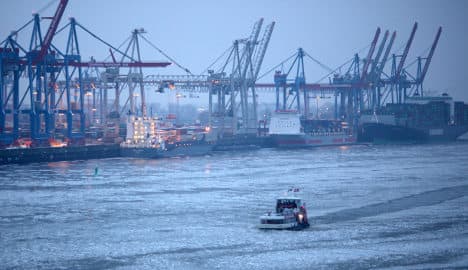German economic recovery put on hold

Europe's biggest economy stuttered to a halt late last year and consumer sentiment continued to fall in the following months, but analysts say another recession in Germany is not in the cards.
German activity stagnated in the fourth quarter of 2009, with final official statistics released on Wednesday confirming zero growth from October through December.
"The slight upward trend observed for the economy in the second and third quarter of 2009 did not continue," the Federal Statistics Office said in a statement.
A major reason was a one percent drop in household consumption, which along with lower public spending and business investment left trade as the only contributor to gross domestic product (GDP).
Consumption had been underpinned by a cash-for-clunkers premium for the auto industry that expired in early September and "consumption life after the car scrap scheme does not exist," ING senior economist Carsten Brzeski noted.
German consumer sentiment has been falling steadily and marked its fifth decline in a row when the GfK research institute released its latest barometer, which dipped to an indexed 3.2 points for March from 3.3 points in February.
"Germans have evidently come to the conclusion that the pace of economic recovery will slow again in the coming months," a GfK statement said.
Worries about rising unemployment and the effect of debt and deficit crises in Greece and other southern European countries are weighing on sentiment, the group said.
Analysts pointed to strong demand for German products however and insisted that once cold winter weather had passed, the economy would get back on track.
"Jack Frost is causing substantial disruptions in construction activity and also retail sales," UniCredit economist Alexander Koch said. "We keep our view that the export-driven recovery of the German economy remains intact at the beginning of the year."
Brzeski agreed that "the hibernation should be short."
Owing to a massive drop of 3.5 percent in the first three months of 2009, the German economy suffered its worst post-war recession last year, contracting by five percent compared with 2008, the statistics data confirmed.
Fourth quarter activity "was supported only by foreign trade," it said, with exports rising 3.0 percent from the previous quarter, while imports decreased by 1.8 percent.
The Federal Statistics Office revised the 2009 German public deficit higher meanwhile to €79.3 billion ($107 billion) or 3.3 percent of GDP, from an initial estimate of 3.2 percent.
Under the European Union's Stability and Growth Pact, EU members are supposed to run deficits no larger than 3.0 percent of GDP, and work towards a balance or even a surplus in times of economic growth.
Comments
See Also
German activity stagnated in the fourth quarter of 2009, with final official statistics released on Wednesday confirming zero growth from October through December.
"The slight upward trend observed for the economy in the second and third quarter of 2009 did not continue," the Federal Statistics Office said in a statement.
A major reason was a one percent drop in household consumption, which along with lower public spending and business investment left trade as the only contributor to gross domestic product (GDP).
Consumption had been underpinned by a cash-for-clunkers premium for the auto industry that expired in early September and "consumption life after the car scrap scheme does not exist," ING senior economist Carsten Brzeski noted.
German consumer sentiment has been falling steadily and marked its fifth decline in a row when the GfK research institute released its latest barometer, which dipped to an indexed 3.2 points for March from 3.3 points in February.
"Germans have evidently come to the conclusion that the pace of economic recovery will slow again in the coming months," a GfK statement said.
Worries about rising unemployment and the effect of debt and deficit crises in Greece and other southern European countries are weighing on sentiment, the group said.
Analysts pointed to strong demand for German products however and insisted that once cold winter weather had passed, the economy would get back on track.
"Jack Frost is causing substantial disruptions in construction activity and also retail sales," UniCredit economist Alexander Koch said. "We keep our view that the export-driven recovery of the German economy remains intact at the beginning of the year."
Brzeski agreed that "the hibernation should be short."
Owing to a massive drop of 3.5 percent in the first three months of 2009, the German economy suffered its worst post-war recession last year, contracting by five percent compared with 2008, the statistics data confirmed.
Fourth quarter activity "was supported only by foreign trade," it said, with exports rising 3.0 percent from the previous quarter, while imports decreased by 1.8 percent.
The Federal Statistics Office revised the 2009 German public deficit higher meanwhile to €79.3 billion ($107 billion) or 3.3 percent of GDP, from an initial estimate of 3.2 percent.
Under the European Union's Stability and Growth Pact, EU members are supposed to run deficits no larger than 3.0 percent of GDP, and work towards a balance or even a surplus in times of economic growth.
Join the conversation in our comments section below. Share your own views and experience and if you have a question or suggestion for our journalists then email us at [email protected].
Please keep comments civil, constructive and on topic – and make sure to read our terms of use before getting involved.
Please log in here to leave a comment.